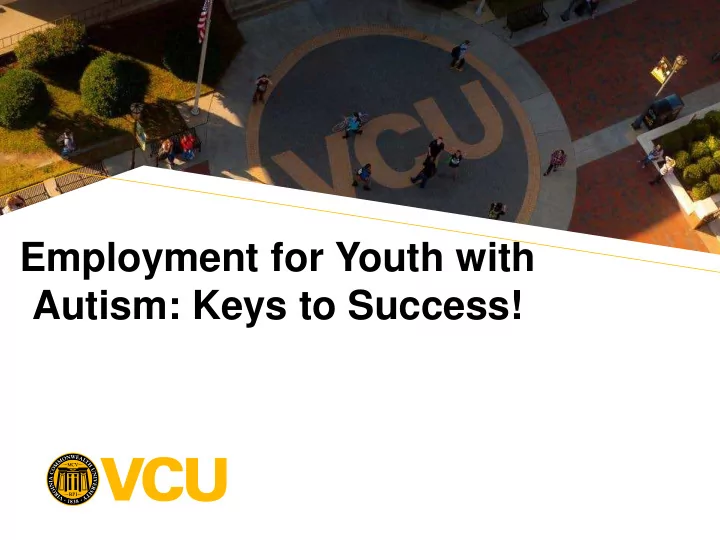

Employment for Youth with Autism: Keys to Success!
Paul Wehman PhD Professor of Physical Medicine and Rehabilitation Chairman Division of Rehabilitation Research Director of VCU-RRTC Medical College of Virginia Virginia Commonwealth University Carol Schall PhD Assistant Professor of Special Education Co-Director of VCU Autism Center for Excellence Virginia Commonwealth University
From Adolescence to Adulthood
Before we know it… Adolescents become adults!! (Shreek!)
Then …What do we do?
Do we want this…?
(Pioneer Press: John Doman 2012)
…Or this?
Damien
Work is Important to Individuals with ASD! PAY THE BILLS! Contribute to Society
What do we know about EMPLOYMENT OF INDIVIDUALS WITH AUTISM AND OTHER DEVELOPMENTAL DISABILITIES? 14
Labor Force Participation (ASD) Vast majority unemployed; or if working under employed Estimated 50-75% unemployed VR does not have resources nor program structure for long term solution
Research on ASD and Employment Shattuck (2010; 2012) examined patterns of service use among youth with ASD from the NLTS2 sample. Data on youth who exited high school. 6% had competitive jobs, & Outcomes worse than peers with other disabilities as much as almost 7 years post high school (Comparison: LD, SLD, ID)
17 Roux, Anne M., Shattuck, Paul T., Rast, Jessica E., Rava, Julianna A., and Anderson, Kristy, A. National Autism Indicators Report: Transition into Young Adulthood. Philadelphia, PA: Life Course Outcomes Research Program , A.J. Drexel Autism Institute, Drexel University, 2015.
18 Roux, Anne M., Shattuck, Paul T., Rast, Jessica E., Rava, Julianna A., and Anderson, Kristy, A. National Autism Indicators Report: Transition into Young Adulthood. Philadelphia, PA: Life Course Outcomes Research Program , A.J. Drexel Autism Institute, Drexel University, 2015.
So… What do we know about High school and transition to adulthood for students with ASD?
High School Curriculum
Non-Academic/Non-Vocational
Future Directions for Policy & Practices in Autism Education Improve High School Curriculum and Services Improve Access to Internships and Employment During High School Promote Postsecondary Education and Dual Enrollment Promote Inclusion and Provide Social Skill Instruction Provide Systemic Instruction to Increase Functional Literacy, Independence, and Self-Determination
Keys to Success
Going to College: A great way to grow up
Why Attend College? “I would like to participate in this program because I think it will help me get a better job. It will give me something else to do besides watching TV and maybe I can make some friends.”
Employment Driven De sire d o utc o me is c o mpe titive e mplo yme nt in stude nt’ s inte re st a re a b a se d o n c o urse s & e xpe rie nc e s Curric ulum inc lude s: • Ca re e r e xplo ra tio n • Ca mpus pa rt-time E mplo yme nt during the sc ho o l ye a r • I nte rnships during the fina l se me ste r
Internships Project SEARCH Plus ASD Supports (VCU-RRTC, 2016)
Internship Key Points Paid or unpaid? NOT volunteering Working in a real job with support Has onsite mentor Is there for educational purpose DOES NOT replace a paid employee May not actually do a whole job, but purpose is to learn job skills and behaviors
Employment Outcomes In Community Based Integrated Employment 100 90 N = 54 87 Treatment = 31 Percent Employed 74 80 Control = 18 60 Treatment 40 Control 20 12 6 6 0 0 0 Baseline Graduation 3 Months 12 Months Data Collection Point (VCU-RRTC, 2016)
Supported Employment Supported Employment refers to service provisions where people with disabilities, are assisted with obtaining and maintaining community-based, integrated employment with support from a job coach and/or the use of person- centered approaches. (VCU-RRTC, 2016)
Additional Training for Job Coaches • Understand ASD • Understand Business • Learn EBPs – Work not School – Behavior Support and – Building trust Access to Regular – Understand business needs Consultation – Provide training to co- – Reinforcement workers and supervisors – Systematic Instruction – Building relationships – Data Based Decision Making – Understanding the work culture – Visual Supports – Antecedent Interventions – Assessing the environment for Match – Functions of Behavior
Customized Employment Customized Employment is a flexible process designed to meet the needs of the job candidate with a disability and the employer and can take such forms as task reassignment, job carving, and job sharing, leading to a new or modified job description (VCU-RRTC, 2016)
www.worksupport.com www.vcuautismcenter.org http://www.centerontransition.org/
Recommend
More recommend